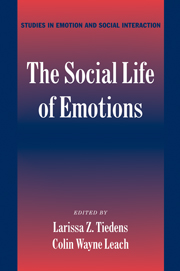Book contents
- Frontmatter
- Contents
- Acknowledgements
- List of Contributors
- The Social Life of Emotions
- Introduction: A World of Emotion
- PART I THE INTERPERSONAL CONTEXT
- PART II THE INTRAGROUP CONTEXT
- PART III THE INTERGROUP CONTEXT
- 11 Intergroup Emotions
- 12 Intergroup Contact and the Central Role of Affect in Intergroup Prejudice
- 13 Judgments of Deserving and the Emotional Consequences of Stigmatization
- 14 Group-based Emotions and Intergroup Behavior
- 15 Interpreting the Ingroup's Negative Actions Toward Another Group
- 16 Intergroup Schadenfreude
- Index
- References
15 - Interpreting the Ingroup's Negative Actions Toward Another Group
Emotional Reactions to Appraised Harm
Published online by Cambridge University Press: 01 April 2011
- Frontmatter
- Contents
- Acknowledgements
- List of Contributors
- The Social Life of Emotions
- Introduction: A World of Emotion
- PART I THE INTERPERSONAL CONTEXT
- PART II THE INTRAGROUP CONTEXT
- PART III THE INTERGROUP CONTEXT
- 11 Intergroup Emotions
- 12 Intergroup Contact and the Central Role of Affect in Intergroup Prejudice
- 13 Judgments of Deserving and the Emotional Consequences of Stigmatization
- 14 Group-based Emotions and Intergroup Behavior
- 15 Interpreting the Ingroup's Negative Actions Toward Another Group
- 16 Intergroup Schadenfreude
- Index
- References
Summary
Social identity theory (Tajfel & Turner, 1986) claims that how people interpret group-relevant events depends on their own group membership and the structural relations that exist between the ingroup and a salient comparison outgroup. When people think of themselves as a member of a social group, they are motivated to protect the identity of their group, and this can lead them to appraise the ingroup's actions in ways that benefit their ingroup (Baumeister & Hastings, 1997; Iyer, Leach, & Pedersen, in press). We argue that such ingroup-serving motivations affect the appraisal of ingroup actions and the emotions that group members experience when they self-categorize as members of their group (Branscombe, Doosje, & McGarty, 2002; Montada & Schneider, 1989).
Even when the self has clearly played no causal role in an event, depending on the meaning that event has for a valued social identity, differential emotional reactions can occur (Branscombe et al., 1993; Cialdini et al., 1976; Doosje et al., 1998; Yzerbyt et al., 2002). As Smith (1999) notes, group-based emotional responses rest on appraisals that consider the event's implications for one's social identity, whereas personal emotional responses are based on appraisals that consider the event in terms of its implications for personal identity. In this chapter, we explore the processes that are instigated when people are reminded of their ingroup's past or present harmful actions toward another group. We focus on how appraisals that reduce the severity and injustice of the ingroup's actions can undermine the experience of collective guilt.
- Type
- Chapter
- Information
- The Social Life of Emotions , pp. 314 - 335Publisher: Cambridge University PressPrint publication year: 2004
References
- 80
- Cited by



